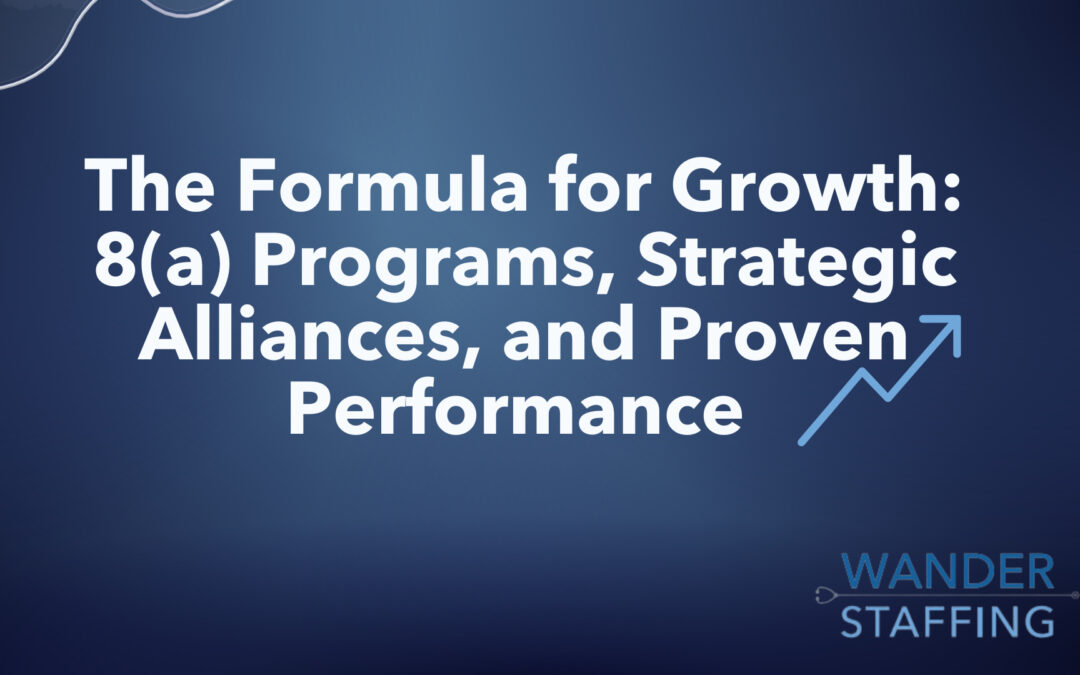In government contracting, success is rarely a solo endeavor. Collaboration is key, particularly for businesses participating in the 8(a) Business Development Program. Strategic partnerships—whether through teaming agreements, joint ventures, or mentor-protégé relationships—enable small and disadvantaged businesses to scale and compete on a national stage.
This article explores how businesses can leverage the opportunities presented by 8(a) programs and strategic partnerships to expand their reach, build credibility, and prepare for sustained growth beyond program eligibility.
What Are 8(a) Programs and Why Do They Matter?
The 8(a) Business Development Program, administered by the Small Business Administration (SBA), provides invaluable support to small and disadvantaged businesses. Designed to help these organizations overcome barriers to entry in government contracting, the program offers exclusive access to set-aside contracts, business development resources, and mentor-protégé opportunities.
“Partnerships are really big,” Rachel McGee, COO of Wander Staffing, explains. She highlights the importance of building relationships early, particularly as businesses prepare for life beyond the program’s limits: “As we exit 8(a), we need to ensure we have built partnerships with smaller successful 8(a)s.” This forward-thinking approach ensures businesses remain competitive even after graduating from 8(a) eligibility.
The Role of Strategic Partnerships in Scaling
Strategic partnerships offer businesses a way to expand their capabilities and access opportunities they might not reach independently. By pooling resources, past performance, and specialized expertise, partnerships can transform a company’s potential.
For example “You may choose to form a joint venture or a mentor-protégé agreement to be able to share past performances or credentials for certain efforts,” McGee notes. She emphasizes the value of formal agreements, such as joint ventures, that enable companies to combine performance histories and credentials. Teaming agreements, which are more informal, can also provide a starting point for collaboration, but joint ventures and mentor-protégé arrangements offer the added benefit of shared access to licenses, past performance, and set-asides.
The Power of Leveraging Past Performance
Credibility is a cornerstone of success in government contracting. Strategic partnerships allow businesses to leverage past performance—a critical factor in winning contracts.
This approach has been pivotal for Wander Staffing. Through partnerships, the company has not only accessed new labor categories but also expanded its expertise in areas like ambulance services. By building on their track record, they’ve positioned themselves as a reliable and capable partner in the eyes of contracting officers.
Building for Life Beyond 8(a) Programs
Preparing for growth after 8(a) program graduation is essential for long-term success. Businesses that rely too heavily on set-aside contracts risk stagnation once eligibility expires. “We need to ensure that we have built partnerships with smaller successful 8(a)s so we can continue to have a piece of that set-aside pie,” McGee emphasizes.
Diversifying labor categories and forging alliances with other small businesses are critical strategies. These steps not only mitigate risks but also position companies for sustainable growth in the competitive government contracting landscape.
How to Build Effective Partnerships
To form successful partnerships, businesses must focus on shared goals and mutual benefits. Researching and targeting potential partners that complement your capabilities is the first step. Formalizing agreements through teaming arrangements, joint ventures, or mentor-protégé programs ensures clarity and alignment.
McGee advises against over-dependence on a single partner or poorly structured agreements. Instead, businesses should view partnerships as a way to advance their strategic goals, ensuring every collaboration moves their organization forward.
Lessons from Wander Staffing
Wander Staffing exemplifies how strategic partnerships can drive success. By aligning with larger companies, they’ve diversified their labor categories and expanded their reach. Their teaming agreements and joint ventures have enabled them to pool resources and past performance, creating stronger bids for major contracts.
“We fill what we win,” McGee states, describing Wander Staffing’s commitment to excellence. Many companies struggle to fulfill awarded contracts, but Wander’s proactive approach—focusing on quality and capability—sets them apart. This ethos, combined with their strategic use of 8(a) programs and partnerships, positions them as a leader in the industry.
Strategic partnerships and 8(a) programs are powerful tools for small and disadvantaged businesses in government contracting. By leveraging these resources, businesses can scale, build credibility, and prepare for growth beyond 8(a) eligibility. Wander Staffing’s success underscores the importance of collaboration, careful planning, and a commitment to delivering on promises.
For businesses looking to thrive in government contracting, the message is clear: partnerships are not just helpful—they’re essential.

